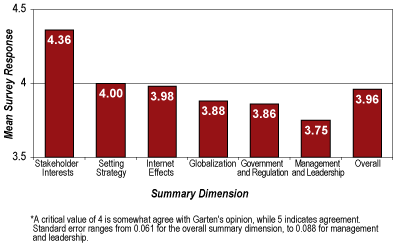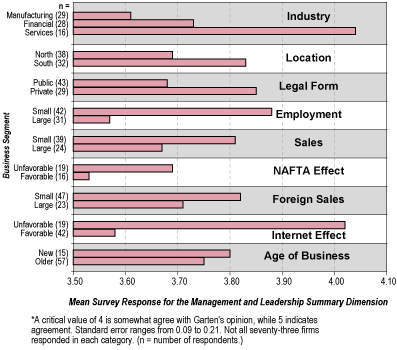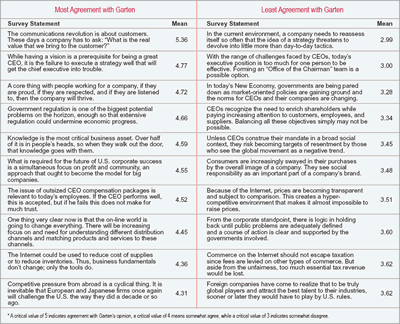The Mind of the Indiana CEO: Views on Emerging Business Issues
Purdue University North Central
Purdue University North Central
Jeffery Garten, dean of the School of Management at Yale University, has extensive exposure to the domestic and international business scene. The opinions expressed in his book, The Mind of the CEO, were shaped by his contacts with executives of forty world-leading firms, people with a sharp eye on the changing world environment and possessing thoughtful insights about emerging trends.
A reading of this book reveals a number of interesting yet controversial statements. Garten believes that CEOs must take a more active role in shaping public policy. CEOs should abandon narrow corporate and industry agendas and assist governments in developing appropriate national economic policies and forming international economic institutions to guide economic development. His proposals for a more proactive business community in economic policy development appear throughout The Mind of the CEO.
Do Indiana CEOs agree or disagree with Garten’s position on these emerging business issues? To answer this question, we administered a survey of Indiana CEOs to find out (see sidebar).
Surveying CEOs
Indiana executives were asked their opinions on a series of statements about emerging business issues considered important for this decade. The forty statements are based on an interpretation of statements found in Jeffery Garten’s book, The Mind of the CEO. Respondents indicated the extent they agreed or disagreed with Garten. Possible answers ranged from 1 (strongly disagree) to 6 (strongly agree). A NR choice was available if the statement did not apply or if the CEO had no opinion. Using the survey scale, a critical value of 5 indicates agreement with Garten, a critical value of 4 signals somewhat agree, while a critical value of 3 means a somewhat disagree position.
The forty statements were condensed into six summary dimensions to facilitate data analysis and subsequent discussion. Each statement was classified into one of the summary dimensions using a thematic categorization scheme.
Results were reported at both the statewide level and at the group level for the forty statements. Only the six summary dimensions were analyzed at the business segment level. The authors would like to thank the seventy-three CEOs who responded to the survey.
Views on Emerging Business Issues
But why should Garten’s viewpoints on emerging business issues be important to CEOs in Indiana? While Garten is respected for his background, he holds a distinct East Coast perspective when defining issues and proposing solutions. He favors an intense and necessary public-private partnership approach when outlining possible solutions. Thus, if Indiana executives share his views, how far does agreement with Garten also imply accepting his remedies? One inference from an agreeing position is tacit acceptance of Garten’s solutions and, thus, accepting whatever economic impact these remedies may have on Indiana’s economy. The exact impact on Indiana of a particular issue is difficult to say without knowing the specific nature of the proposed solution. But using previous experience with Washington-based economic policies, perhaps Indiana has reason for guarded concern.
For example, a primary concern is the income transfer out of Indiana. We calculate that about ninety-five cents is returned to Indiana for every dollar of taxes sent to Washington in 2001. (1) At this rate of income transfer, in twenty years the equivalent of the entire state’s personal income disappears. And there is the loss of $1,662 of state taxes per average taxpayer, (2) plus the local tax revenues forgone on this lost wealth. Such a slant from Washington-imposed policies could be at odds with the state’s long-term economic health. Thus, what might seem a suitable policy from an East Coast viewpoint may not be seen in the same favorable light from a Hoosier perspective.
Statewide Results
As seen in Table 1, only one statement with a 5.36 value indicates agreement with Garten’s position (knowing what value the firm brings to its customers is a key to successful business). Two more statements are within two standard errors below 5 (exceeding a 4.70 cutoff point), also indicating that respondents agree with Garten on these two issues.
Table 1
Top Ten Survey Statements at Both Ends of the Survey Spectrum
Click for larger image
Of the total forty statements examined (only the highest and lowest ten are reported here), twenty-six (65 percent) either exceed the critical value of 4 or are within two standard errors below (exceeding a 3.70 cutoff point). In addition to the three agree with statements, respondents tend to somewhat agree with Garten on twenty-three other statements, inferring that Indiana CEOs tend somewhat favorably toward his views.
Figure 1 shows the statewide results for the six summary dimensions (see the discussion in sidebar concerning summary dimensions).
Figure 1
Statewide Results by Summary Dimension

Indiana CEOs somewhat agree with Garten on five of six dimensions (exceeding a 3.82 cutoff point), the highest being stakeholder interests and the lowest being government and regulation.
It is the management and leadership summary dimension where opinions vary most from Garten’s position. The varying opinions between business segments account for this divergence.
Business Segment Results
The management and leadership dimension illustrates a pattern of divergent opinions between business segments (see Figure 2). CEOs at variance most with Garten’s viewpoints work in manufacturing, at a north location, in a large firm, in a public firm, in older companies, have a favorable experience with NAFTA, have a favorable experience with the Internet, and have export sales exceeding 6 percent of total sales.
Figure 2
Analysis of the Management and Leadership Summary Dimension by Business Segment

This analysis points to the idea that Indiana CEOs appear to express confidence in their own capabilities to solve emerging problems.
Specific to the management and leadership dimension, there is no across-the-board agreement as positions within the industry segment illustrate. Manufacturing and financial firms somewhat disagree with Garten while service firms somewhat agree with his positions. This pattern is also noticed for other segment comparisons.
Indiana executives prefer to be self-reliant in dealing with problems, even if Garten believes these issues are beyond the average CEO’s ability to handle effectively. We conclude that Indiana executives
- are confident they can cope with the changing world environments;
- discount the seriousness of the challenge that Garten believes exists;
- appear more upbeat about their ability to meet the new global competition.
Summary
Results indicate some differences between Indiana CEOs and Garten with respect to the complexity of the business environment. In particular, CEOs differ most from Garten regarding their ability to effectively manage in the new environment. Garten asserts that this environment is becoming “a turbulent sea” and “too difficult for most CEOs to successfully handle all at once.” (3) Indiana executives, on the other hand, surmise that the business environment is already complex and that these emerging trends of greater complexity that Garten speaks of are already “business as usual” for them.
Implications for Indiana
First, Indiana CEOs appear more conservative and self-reliant, believing they are capable of dealing with the complexities of a changing global business environment. As a corollary, this suggests that turning to the public sector for direction for solving problems might be pursued only after careful consideration.
Second, Indiana executives generally hold homogenous views (as seen in Figure 1). This implies that backing efforts through a statewide business community approach might be possible, thus speeding up and focusing effort on solutions. The advantage of “one mind” is that massed support gets more attention and generates more impact than when different approaches are pursued.
Third, a large proportion of executives expressed no opinion about the effect that NAFTA has had on their businesses. Of those that are impacted by NAFTA, just under half reported a favorable experience. Also noteworthy is that one-third of companies indicated export sales exceeding the 6 percent mark. This leads to the idea that foreign market development has potential for Hoosier business expansion.
Fourth, well over half of respondents indicated that the Internet has had a favorable effect on their business. This implies that enhancing development of the Internet within the state should be encouraged.
Will Indiana executives come to a common position for addressing key emerging issues? Will it be along Garten’s suggested approach of a business-government combination or some other path? Based on our survey results, we think the direction for Indiana CEOs is towards self-reliance versus the public-private partnerships that Garten favors.




